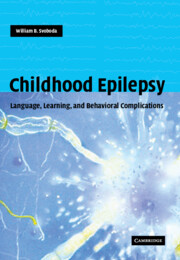Book contents
- Frontmatter
- Contents
- Preface
- Glossary
- 1 Looking ahead
- Part I Speech and language problems
- 2 Language: the challenge
- 3 Speech, language, and communication
- 4 Speech and language problems in epilepsy
- 5 Seizure types and speech and language risks
- 6 Language regression with epilepsy syndromes
- 7 Other epilepsy language syndromes
- 8 Seizure-management effects
- 9 Evaluation of speech and language problems
- 10 Management of speech and language problems in epilepsy
- 11 Behavior consequences
- Part II Learning problems
- Part III Behavior problems
- Index
- References
4 - Speech and language problems in epilepsy
from Part I - Speech and language problems
Published online by Cambridge University Press: 26 October 2009
- Frontmatter
- Contents
- Preface
- Glossary
- 1 Looking ahead
- Part I Speech and language problems
- 2 Language: the challenge
- 3 Speech, language, and communication
- 4 Speech and language problems in epilepsy
- 5 Seizure types and speech and language risks
- 6 Language regression with epilepsy syndromes
- 7 Other epilepsy language syndromes
- 8 Seizure-management effects
- 9 Evaluation of speech and language problems
- 10 Management of speech and language problems in epilepsy
- 11 Behavior consequences
- Part II Learning problems
- Part III Behavior problems
- Index
- References
Summary
Children with epilepsy may not use language as well as non-epileptic children (Green & Hartlage, 1971). Language functions are especially sensitive to transient disturbances of thought, such as would appear with seizure discharges. Imaginative fluency may be affected significantly (Davies-Eysenick, 1952). Transient language disturbances in children with focal epilepsy may be ictal or postictal phenomena (Serafetinides & Falconer, 1963). In school-age children, epilepsy may cause language disorders in syntactic and semantic processes that are similar to disorders observed in frontal-lobe dysfunction and in dyslexic children (Kossciesza et al., 1998).
Children are not adults, and they respond differently to language disturbances. The adult is more apt to talk excessively, to use trite or stereotyped phrases, or to repeat certain words, phrases, or sentences. The child does not confuse words of a similar nature as often as the adult does. A child's speech may be slow and stumbling, difficult to understand, or peppered with unexpected and sometimes peculiar word selections that are similar to, but not correct for, the idea. More subtle signs of delayed or deviant development are seen. The child may not be able to speak or may speak with a slow, labored, slurred, and often vague speech pattern, as if attempting to compensate for the language difficulties. The speech may clear markedly for periods of time, corresponding to the introduction of certain anticonvulsants or even a bout of illness. Sometimes, however, medication or illness may aggravate the speech problem.
Information
- Type
- Chapter
- Information
- Childhood EpilepsyLanguage, Learning and Behavioural Complications, pp. 31 - 49Publisher: Cambridge University PressPrint publication year: 2004
